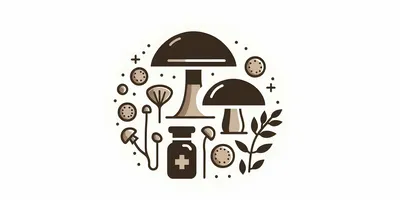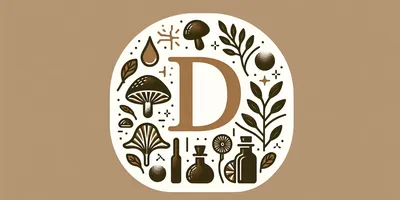King oyster mushroom Benefits (Pleurotus eryngii)
King oyster mushroom (Pleurotus eryngii) is an edible mushroom and medicinal mushroom.

Supports Gut Health
King oyster mushrooms may have significant benefits for gut health, primarily through their immunomodulatory and genoprotective properties. Research highlights this mushroom's ability to modulate immune responses, notably affecting cytokine levels. These anti-inflammatory and pro-inflammatory cytokines are crucial for maintaining immune homeostasis, suggesting implications for creating functional foods aimed at elderly populations who require support for a healthy immune system.
In addition, another study identifies how the fermentation products of these mushrooms contribute to protecting against DNA damage in gut cells. With an increase in short-chain fatty acids and other beneficial metabolites post-fermentation, these mushrooms support the microbiome's role in promoting colon health and preventing inflammation.
Further demonstrating King oyster mushrooms' positive impact on gut health, research involving broiler chickens indicates that dietary inclusion of mushroom waste by-products enhances intestinal microbiota balance, improves antioxidant capacities, and strengthens gut barrier function. This points to the broader potential of these mushrooms in improving gut health across different species.
Meanwhile, in a pre-clinical model focusing on the mitigating effects of dietary imbalances, King oyster mushroom supplementation was associated with ameliorating growth inhibition and bone health issues potentially through positive alterations of the gut microbiome. This underscores the mushrooms' role in influencing the composition of gut bacteria linked to inflammation and overall bodily health.
Collectively, these studies suggest the King oyster mushroom as a promising dietary component for supporting gut health through various mechanisms, including immunomodulation, genoprotection, microbiota balance, and antioxidant capacity.
Learn about mushrooms with gut health benefits.

Supports Mental Health with Antidepressant Properties
Recent studies have unveiled novel benefits of King oyster mushroom that extend beyond basic nutrition. Notably, an insightful paper titled "Identification of the Antidepressant Function of the Edible Mushroom Pleurotus eryngii" reveals the mushroom's potential in supporting mental health. Specifically, King oyster mushroom contains functional molecules such as tryptamine, which is associated with antidepressant effects. The study utilized ethanol extraction of the mushroom's fruiting body, and subsequently purified the extract with XAD-16 resin and HPLC separation to identify the presence of tryptamine.
The research included serotonin receptor binding assays, which indicate how substances might influence mood and depression. Complementary in vivo tests involving mice and the forced swimming test provided additional evidence of the mushroom's effect on mood regulation. The results of these investigations have been promising, suggesting that the King oyster mushroom may have a significant impact as a natural antidepressant. The study concludes that extracts from the mushroom demonstrate antidepressant properties, affirming the potential for King oyster mushroom to be developed as a health supplement aimed at treating depressive symptoms.
Understanding the relationship between diet and mental well-being is essential, and the King oyster mushroom emerges as a food with promising benefits. For those interested in the potential therapeutic applications of natural products, the findings of this study can be explored further in the published article available here.
Learn about mushrooms with antidepressant benefits.

Anti-Inflammatory Benefits
The inclusion of King oyster mushroom by-products in diets has shown promising health benefits, particularly with regards to its anti-inflammatory properties. A study exploring the effects of mushroom waste compost by-products on broiler chickens revealed significant findings. The dietary integration of these substances was associated with an improved balance in the intestinal microbiota and a stronger anti-oxidative status.
Adding King oyster mushroom waste compost to the chickens' feed not only enhanced their gut health by promoting beneficial bacteria but also led to a decreased inflammatory response. This suggests the mushroom's role in potentially modulating the body's inflammatory process, which is crucial for both poultry and human health.
Furthermore, the research highlighted that the anti-inflammatory effect of the King oyster mushroom was coupled with improved antioxidant capacities and gut barrier function, as well as a reduction in pathogenic bacteria within the gut. All these factors contribute fundamentally to the organism's overall well-being, and could help in the prevention and management of inflammatory conditions.
Learn about mushrooms with anti-inflammatory benefits.

Antioxidant Benefits of King Oyster Mushroom
King oyster mushroom is not only known for its robust flavor and texture but also for its impressive antioxidant capacity. Recent research has highlighted that diets incorporating mushroom waste compost by-products, such as those from King oyster mushroom, contributed to improved antioxidant statuses in broiler chickens. This is indicative of the mushroom's potential to enhance oxidative balance when included in the diet.
Moreover, the metabolites found in King oyster mushroom have shown to exhibit genoprotective properties following fermentation by human fecal microbiota. The presence of β-glucans within these mushrooms has been linked with protecting DNA against damage, emphasizing their role in promoting cellular health.
Fascinatingly, another study provides evidence of the King oyster mushroom's genoprotective activity both in vitro and in vivo after fermentation by fecal microbiota. The findings support the mushroom's ability to significantly reduce DNA damage, which may be a result of enhanced antioxidant defense mechanisms triggered by its compounds.
Additionally, the incorporation of waste mushroom compost into animal feeds has been investigated for its effects on fat metabolism and antioxidant capacity. Results demonstrated that supplementation improved fat breakdown and boosted the expression of key antioxidant genes, reinforcing King oyster mushroom's role in supporting metabolic health and oxidative balance.
Altogether, these studies underline the potential of King oyster mushroom as a functional food with significant antioxidant benefits, capable of fostering protection against oxidative stress and promoting overall health.
Learn about mushrooms with antioxidant benefits.

Nutritional Benefits of King Oyster Mushroom
The King oyster mushroom is not only known for its savory flavor but also its impressive nutritional profile, which is enhanced by certain cultivation and cooking methods. Recent research has found that these mushrooms have a high content of β-glucans, which are naturally occurring polysaccharides that have been recognized for their immunomodulatory and anti-cancer properties. The study demonstrated that the King oyster mushroom, particularly its stalk, contains the highest total glucan and β-glucans content among various Pleurotus species.
Moreover, the study highlights the importance of environmental and growth conditions on mushroom compositions. By incorporating olive mill solid waste (OMSW) into the cultivation substrate, researchers were able to significantly increase the glucan content in these mushrooms. Such enhancements make the King oyster mushroom a more potent source of nutritive supplements beneficial for improving health outcomes.
Furthermore, the preparation of these mushrooms also plays a crucial role in optimizing their health benefits. A study on the effects of different cooking methods on King oyster mushrooms revealed that microwave cooking could boost their antioxidant activity. The presence of antioxidants is vital for reducing oxidative stress and plays a role in preventing chronic diseases. Although the study observed varying impacts of cooking methods on the mushrooms' antioxidant activities, it emphasizes that the right cooking technique can potentially increase the nutritional value, enhancing the mushrooms' role in promoting good health.
Learn about mushrooms with nutritional benefits.

Immunomodulatory Effects
King oyster mushroom is not only a delectable addition to a variety of dishes but also brings to the table significant immunomodulatory benefits. These properties enhance the body's immune response and could play a key role in maintaining overall health.
In a compelling demonstration of these benefits, the mushroom demonstrated genoprotective activity after fermentation by fecal microbiota. This process led to a noteworthy reduction in DNA damage among treated human lymphocytes in vitro. Moreover, in a living organism model, mice received different doses of mushroom extract, which led to a significant decrease in micronuclei formation usually induced by the chemotherapeutic agent cyclophosphamide. Interestingly, this effect was particularly pronounced in young female mice. This indicates that King oyster mushroom not only has a protective effect on genetic material but also seems to enhance the immune system and antioxidant responses.
Another facet of King oyster mushroom's immunomodulatory action is its high content of β-glucans, a class of polysaccharides known for their immune-enhancing properties. An insightful study found that the mushroom can have an elevated concentration of β-glucans, especially when cultivated on substrates such as olive mill solid waste. This innovative cultivation technique could effectively double the glucan content, potentially doubling the health benefits. Given the well-documented role of β-glucans in immune function, this finding positions King oyster mushroom as a particularly valuable dietary component with promising health applications.
Through these studies, it becomes evident that King oyster mushroom offers a powerful combination of genoprotective effects and enhanced immunomodulation, making it a worthy candidate for dietary regimens aimed at promoting overall health and resilience.
Learn about mushrooms with immunomodulatory benefits.

Anti-cancer Benefits
King oyster mushroom has been recognized for its potential anti-cancer properties, primarily due to its high β-glucan content. These β-glucans are a type of fiber with notable immunomodulatory and anti-cancer properties. The stalk of the mushroom is particularly rich in these compounds, placing King oyster mushroom as a leading source among the Pleurotus species.
Research on enhancing the β-glucan content in King oyster mushrooms has shown promising results. One study demonstrates that the mushroom's β-glucan content can indeed be increased by altering the growth medium. Specifically, it was found that using olive mill solid waste (OMSW) as a substrate can significantly augment the glucan concentrations. Incorporating 80% OMSW into the substrate resulted in doubling the total glucan content. This finding is significant as it not only presents a method to boost the health benefits of these mushrooms but also highlights a sustainable use for olive mill by-products.
With the high β-glucan content, especially when increased through specific cultivation methods, King oyster mushroom holds great promise as a dietary component in the prevention and support in the treatment of cancer. The mushrooms' natural compounds may help stimulate the immune system, aiding it in identifying and fighting cancerous cells. The improvement in the nutritional profile of King oyster mushrooms through enhanced cultivation practices can thus play an essential role in developing functional foods with anti-cancer properties. Read the study for more detailed insights on β-glucan enhancement in King oyster mushrooms.
Learn about mushrooms with Anti-cancer benefits.

Immunomodulating Benefits
The King oyster mushroom has shown promise in the field of immunomodulation, which is the regulation of the immune system. Immunomodulation can help in maintaining a balanced immune response that fights infection while avoiding excessive inflammation that could lead to autoimmune disorders.
One pivotal study "Immunomodulating Activity of Pleurotus eryngii Mushrooms Following Their In Vitro Fermentation by Human Fecal Microbiota" examined how elements derived from King oyster mushrooms could impact immune responses. After fermenting the mushrooms with fecal microbiota from elderly individuals, researchers observed noticeable changes in the immune system. There was a significant alteration in gene expression, which corresponded with the regulation of both pro-inflammatory and anti-inflammatory cytokines. In particular, the production of TNF-α, a substance often associated with inflammation, and IL-10, a cytokine linked to anti-inflammatory responses, was notably affected.
Furthermore, fermentation supernatants from the mushrooms induced beneficial changes in immune cells such as monocytes and dendritic cells within the peripheral blood mononuclear cells (PBMCs). These modifications suggest a potential for the King oyster mushroom to contribute to immune homeostasis - a stable and balanced immune state. To this end, the King oyster mushroom demonstrates significant potential as a functional food ingredient, especially in diets aimed at improving the immune health of the elderly.
Learn about mushrooms with Immunomodulation benefits.

Nutrient-Rich Superfood
King oyster mushrooms are not only a gourmet delicacy but also a nutrient powerhouse, offering a wide array of vitamins, minerals, and other beneficial compounds. A study titled "Pleurotus eryngii Chips—Chemical Characterization and Nutritional Value of an Innovative Healthy Snack" delved into the contents of these mushrooms and uncovered impressive findings.
These mushrooms are a low-calorie food, which makes them a perfect addition to any diet. Yet, they don’t skimp on nutritional content, boasting high levels of fiber and protein—essential components for digestive health and muscle maintenance. The lipid content is low, ensuring that including these mushrooms in one's diet can help in managing weight without compromising on satiety.
One of the standout revelations from the research was the presence of significant quantities of vitamin D2, especially after the mushrooms were UVB-irradiated. Since vitamin D is crucial for bone health and immune function, and considering that deficiencies are common, incorporating King oyster mushrooms can be an excellent dietary strategy to boost this vital nutrient.
In addition to the macronutrients, the study also reported that King oyster mushrooms are rich in essential amino acids, fatty acids, and trace elements, supporting overall health and wellness. Interestingly, the mushrooms have a high Nutrient-Rich Foods (NRF9.3) score when compared to typical snack options, indicating their superior nutritional quality.
What's more, according to the atherogenicity index (AI) and thrombogenicity index (TI), King oyster mushrooms promote heart health by potentially reducing the risk of cardiovascular diseases. An added benefit comes from the hypocholesterolemic/hypercholesterolemic ratios (h/H) present in them, highlighting their role in maintaining cholesterol levels.
Consumer acceptance is as important as nutritional value, and happily, sensory evaluations have confirmed that King oyster mushrooms are pleasing to the palate.
For those keen on exploring this study further, detailed insights await in the full paper which can be accessed here.
Learn about mushrooms with nutrient rich benefits.

Supports Liver Health
King oyster mushroom has demonstrated significant benefits for liver health, particularly in the context of diet-induced liver issues. A study focusing on obesity-related liver dysfunction found that incorporating chitin derived from King oyster mushrooms could lead to substantial improvements. The liver plays a crucial role in metabolizing fats and toxins, and maintaining its health is critical for overall well-being.
In the research titled 'Therapeutic effects of chitin from Pleurotus eryngii on high-fat diet induced obesity in rats', scientists studied the impact of King oyster mushroom chitin on rats following a high-fat diet, which often results in liver problems like fatty liver and elevated liver transaminase levels. The treatment with mushroom chitin not only inhibited weight gain but also reduced harmful serum lipid levels, including total cholesterol, triglycerides, and low-density lipoprotein cholesterol.
Furthermore, the study showed that chitin from King oyster mushroom enhanced hepatic function and antioxidant activity. This contributed to the alleviation of liver steatosis, which is a condition characterized by an abnormal accumulation of fat in the liver. By bolstering the liver's health, King oyster mushrooms help mitigate the risk of aortic atherosclerosis and other complications associated with obesity.
Learn about mushrooms with Liver health benefits.

Supports Weight Loss
The King oyster mushroom has been the subject of nutritional studies with promising results for those interested in weight management. Specifically, its derivative chitin has been found to combat obesity when introduced into the diet. In a pivotal study, chitin from the King oyster mushroom was administered to rats on a high-fat diet—an established model for understanding human obesity. The research revealed significant reductions in key markers of obesity.
The introduction of King oyster mushroom chitin was associated with a noticeable decrease in food utilization rates and accumulation of adipose tissue, effectively curbing the increase in body weight typically observed with high-fat diets. This benefit is crucial for maintaining a healthy weight and preventing the onset of obesity-related complications. Furthermore, this study documented impressive improvements in serum lipid profiles, lowering total cholesterol, triglycerides, and specifically low-density lipoprotein cholesterol, which are all beneficial for cardiovascular health.
Additional health indicators, such as liver transaminase levels, indicate enhanced hepatic function and better antioxidant activity after the inclusion of King oyster mushroom chitin in the diet. These factors contribute to mitigating liver steatosis and aortic atherosclerosis, potentially offering a protective effect against severe obesity-induced pathologies. The findings underscore the potential of King oyster mushroom as part of a nutritional strategy for weight management and the prevention of obesity-related diseases.
Learn about mushrooms with weight loss benefits.

Lipid Reduction Potential
The King oyster mushroom may play a role in reducing cholesterol and managing obesity-related complications, thanks to the presence of certain polysaccharides. According to a study analyzing the therapeutic effects of chitin from King oyster mushrooms on rats with high-fat diet-induced obesity, significant health benefits were reported.
Over the course of four weeks, obese rats treated with King oyster mushroom chitin showed notable decreases in body weight gain and adipose tissue accumulation. Their serum lipid profiles improved, with reduced levels of total cholesterol, triglycerides, and low-density lipoprotein cholesterol. These changes indicate a promising potential for King oyster mushroom in preventing or managing conditions like hyperlipidemia and atherosclerosis.
Furthermore, the study showed that liver health was bolstered following the treatment, with enhanced hepatic function and antioxidant activity. Not only did this result in better liver transaminase levels, but it also mitigated liver steatosis and aortic atherosclerosis in the obese rats.
Incorporating King oyster mushrooms into one's diet could thus be a beneficial strategy for people looking to manage their lipid levels and counter the effects of a high-fat diet. More research on humans is needed to fully understand its potential, but these early findings are certainly promising.
Learn about mushrooms with lipid reduction benefits.

Rich in Antioxidants
King oyster mushrooms are notable for their antioxidant properties, which play a vital role in promoting overall health. Antioxidants are substances that can prevent or slow the damage to cells caused by free radicals—unstable molecules that the body produces as a response to environmental and other pressures. Incorporating antioxidant-rich foods like King oyster mushrooms into one's diet can help combat oxidative stress and reduce the risk of chronic diseases.
Various cooking methods can affect the antioxidant contents and activities in these mushrooms. According to a study titled Influence of customized cooking methods on the phenolic contents and antioxidant activities of selected species of oyster mushrooms (Pleurotus spp.), cooking techniques such as pressure cooking and microwaving can actually enhance the antioxidant activity in King oyster mushrooms. What's particularly interesting is that these increases in antioxidant activities were observed regardless of the mushrooms' total phenolic content - a common indicator of antioxidant capacity.
This study emphasizes that not only are King oyster mushrooms beneficial when consumed raw, but they also retain and can even boost their health benefits through certain cooking methods. The ability of microwave cooking to increase antioxidant activity for King oyster mushrooms suggests an easy and effective way to prepare these mushrooms while maximizing their health-promoting properties.
Learn about mushrooms with antioxidants benefits.

Genoprotective Benefits
King oyster mushrooms have been recognized for their potential in safeguarding genomic integrity. Extensive research has identified their genoprotective properties that could play a crucial role in maintaining colon health. A study investigating the effects of β-glucan-rich mushrooms such as King oyster mushroom, after being fermented by human fecal microbiota, has shed light on this matter.
The fermented supernatants obtained from King oyster mushrooms were tested on human colon adenocarcinoma Caco-2 cells. Intriguingly, these extracts were able to shield the cells against DNA damage caused by tert-butyl hydroperoxide (t-BOOH), a known genotoxic agent. Such protection is an indicator of the mushroom's ability to contribute to cellular health and prevent genotoxicity.
Futhermore, metabolite profiling revealed significant metabolic changes after fermentation. The production of short-chain fatty acids (SCFAs) increased, while there was a depletion of mono- and oligo-saccharides. Given that SCFAs are important for colon health, their enhanced presence suggests that King oyster mushroom's fermentation products could influence the gut microbiome in beneficial ways.
The findings of this study reflect the considerable promise of King oyster mushrooms in promoting genoprotection. Such natural interventions are gaining attention for possibly reducing the risk of colon cancer and enhancing overall gut health.
Learn about mushrooms with Genoprotective benefits.

Low-Calorie Nutritional Powerhouse
For those seeking a balance between healthy eating and satisfying flavors, the King oyster mushroom offers a remarkable solution. A noteworthy study published on its nutritional profile underscored its low-calorie benefits, which are particularly important for weight management and overall health.
The research titled "Pleurotus eryngii Chips—Chemical Characterization and Nutritional Value of an Innovative Healthy Snack" assessed the chemical composition and nutritional value of King oyster mushrooms prepared as a healthy snack. It revealed that these mushrooms are not only low in calories but also rich in dietary fiber and proteins. In absence of added sugars and bearing a low lipid content, they emerge as an excellent snack option.
Furthermore, the study highlighted the snack’s enrichment with vitamin D2 and essential trace elements, elevating its status as a nutrient-dense choice. Sensory evaluations during the research also confirmed favorable taste preferences and consumer acceptance, making it a compelling alternative to traditional, often less-healthy snack options.
Given the challenging task of finding snacks that contribute to dietary needs without excessive caloric intake, the King oyster mushroom stands out with its high Nutrient-Rich Foods (NRF9.3) score. It illustrates the mushroom's potential in promoting a satiating, nutritious diet conducive to maintaining a healthy weight and lifestyle.
Learn about mushrooms with Low-calorie benefits.

High-Fiber Content
The King oyster mushroom is not only praised for its meaty texture and savory flavor, but it's also well-regarded for its nutritional benefits, particularly its high-fiber content. Dietary fiber is essential for maintaining digestive health and aids in the regulation of blood sugar levels.
A notable study titled "Pleurotus eryngii Chips—Chemical Characterization and Nutritional Value of an Innovative Healthy Snack" delved deeply into the chemical and nutritional properties of King oyster mushroom snacks that had been enriched with vitamin D2 through UVB-irradiation and then baked. The research highlighted that these mushrooms are a remarkable source of dietary fiber. This is significant because a high-fiber diet is associated with a range of health benefits, including the potential for weight management, improved gut health, and a reduced risk of chronic diseases.
Moreover, the findings emphasized the snack's low-calorie profile alongside its high fiber and protein contents, making it an exceptional choice for anyone looking to enhance their diet with healthful ingredients without adding excessive calories. It was observed that these healthy snacks had no added sugars and provided a bountiful supply of essential vitamins and trace elements, encompassing a balanced and nutritious profile which was also attested by the NRF9.3 score indicating a superior nutritional value.
Given the importance of incorporating dietary fiber into our daily eating habits, King oyster mushrooms emerge as a versatile and health-beneficial option. They offer a delightful way to enrich the fiber content in our diets without compromising on taste or satisfaction, as also supported by the favorable sensory evaluations from consumers in the study. Learn more about the study.
Learn about mushrooms with High-fiber benefits.

Enhances Vitamin D Levels
King oyster mushrooms are not only delicious but also have a secret superpower - they are potent Vitamin D enhancers when exposed to ultraviolet light. This was explored in a study titled "Pleurotus eryngii Chips—Chemical Characterization and Nutritional Value of an Innovative Healthy Snack" where the mushrooms were irradiated with UVB light. The process dramatically increases the Vitamin D2 content of the mushrooms, making them an even more valuable component of a healthy diet.
Vitamin D has profound effects on our health, particularly in the maintenance of strong bones and immune system support. By incorporating King oyster mushrooms that have been UVB-irradiated into the diet, not only do consumers enjoy a tasty treat but they also benefit from a natural, plant-based source of this essential nutrient. This innovative approach indicates that King oyster mushrooms have a lot of potentials when it comes to addressing common nutritional deficiencies such as Vitamin D insufficiency, often seen in populations with limited exposure to sunlight.
The research further showed that these UVB-enhanced mushrooms retained a high nutritional value after processing, including being low in calories, high in fiber and protein, and rich in other vitamins and trace elements. This makes them an excellent addition to a health-conscious individual's snacking options, with a much higher Nutritional-Rich Foods (NRF9.3) score than many popular snacks. Consumers looking for a delicious, nutritious, and Vitamin D-rich snack would be well-advised to opt for these specially treated King oyster mushrooms.
To dive deeper into the study's findings, check out the published work on the chemical characterization and nutritional value of King oyster mushroom snacks enhanced with Vitamin D.
Learn about mushrooms with Vitamin D benefits.

DNA Protection Benefits
The King oyster mushroom has shown promising genoprotective properties, which refer to its ability to protect DNA from damage. This is significant because DNA damage can lead to cell mutations and various diseases, including cancer.
A compelling study illustrates this benefit by demonstrating a significant reduction in DNA damage in human lymphocytes treated with King oyster mushroom extracts that underwent fermentation by fecal microbiota. This suggests that compounds within the mushroom not only survive the digestive process but may also interact beneficially with our gut microbiome to confer a protective effect on DNA.
Furthermore, research conducted on both young and elderly mice has provided insights into how King oyster mushroom may offer genoprotection in vivo. Mice orally administered with mushroom extract followed by exposure to cyclophosphamide, a chemical known to induce DNA damage, exhibited a reduction in micronuclei formation. Remarkably, this study uncovered that the protective effects were more pronounced in young female mice, indicating potential variations in genoprotection based on age and gender.
In addition to protecting against direct DNA damage, the King oyster mushroom extract was found to upregulate genes associated with antioxidant and immunomodulatory responses. This pinpoints to a multifaceted approach by which the mushroom may safeguard cellular health, encompassing epigenetic mechanisms and the maintenance of cell homeostasis.
Learn about mushrooms with DNA protection benefits.

Disinfection Benefits
King oyster mushroom has been associated with a number of health benefits, but it's also important to note its role in the realm of disinfection and anti-biofilm activity. A recent study has examined the potential of utilizing essential oils, known for their antimicrobial properties, against environmental microorganisms including the King oyster mushroom.
Essential oils of oregano and thyme, encapsulated in poly(ε-caprolactone) nanocapsules, have demonstrated powerful disinfectant properties. The oils contain bioactive phenols such as thymol and carvacrol which contribute to their effectiveness. The research reveals that these nanoencapsulated essential oils can successfully target microbial strains found on various building materials, including fungal strains such as Pleurotus eryngii, without altering the materials' appearance or quality.
This innovative approach could have significant implications for maintaining the integrity of buildings and potentially for safeguarding human health by preventing the spread of harmful microorganisms. The ability of nanocapsule-delivered essential oils to disinfect effectively against organisms like the King oyster mushroom without damaging treated surfaces represents a promising step forward in antimicrobial treatment methods.
Learn about mushrooms with Disinfection benefits.

Combats Biofilm Formation
King oyster mushroom holds promise in the fight against harmful microbial biofilms that can form on various surfaces. Biofilms consist of communities of bacteria and fungi that adhere to surfaces, making them resistant to conventional cleaning methods and posing health risks.
Research into natural and safe methods to prevent and remove these biofilms has led to interesting discoveries, including the potential use of essential oils. In one study, scientists investigated the efficacy of oregano and thyme essential oils, known for their antimicrobial properties, when encapsulated in nanostructures against biofilm-forming microorganisms including King oyster mushroom.
The study focused on evaluating how these nanoencapsulated essential oils could protect against microbial colonization on surfaces such as sandstone and wood, which are prone to degradation from biofilm formation. Their findings revealed that both fungal and bacterial strains, including Pleurotus eryngii, were effectively disrupted by these treatments.
Importantly, the nanoencapsulation method allowed for the beneficial properties of the essential oils to be harnessed without altering the physical appearance of the treated materials, indicating a practical application for the maintenance of structures while promoting hygiene and safety. This highlights a promising avenue for the use of nature-inspired solutions to address biofilm-associated issues in various settings.
Learn about mushrooms with Anti-biofilm benefits.

Biocompatible Benefits
King oyster mushroom exhibits remarkable biocompatible properties, which can be beneficial in various applications. Specifically, one study has highlighted the impressive potential of biocide-encapsulated nanocapsules containing essential oils to fight against microbial colonization on materials. Notably, these essential oils demonstrate strong antimicrobial activities against environmental microorganisms like King oyster mushroom.
In the research titled "Protection and Disinfection Activities of Oregano and Thyme Essential Oils Encapsulated in Poly(ε-caprolactone) Nanocapsules", bioactive phenols such as thymol and carvacrol, primarily found in oregano and thyme, were utilized. These bioactive components are known for their microbial inhibitory characteristics. By encapsulating these essential oils in poly(ε-caprolactone) nanocapsules and applying them to building materials contaminated with organisms including King oyster mushroom, the study assessed their antimicrobial effectiveness.
The result of the study is promising for the use of these nanocapsules in preserving the integrity of materials without compromising their aesthetic or physical properties. Such an approach demonstrates the biocompatibility of using natural substances like essential oils in tandem with materials often found in various environments that humans interact with. This suggests potential applications in food preservation, medicine, and the conservation of historical artifacts.
For a more detailed understanding, read the full study here.
Learn about mushrooms with Biocompatible benefits.

Growth Promotion Benefits
An unbalanced diet high in fat and low in essential nutrients can lead to significant growth inhibition and negative effects on skeletal development. Research has shown that including King oyster mushroom as a dietary supplement can mitigate these adverse effects, helping to maintain normal growth patterns and bone health.
A pre-clinical study revealed that rats on an Unbalanced Diet (UBD) displaying inhibited growth, alongside compromised bone micro-architecture and mineral density, experienced notable improvements when their diet included supplements of the King oyster mushroom. This suggests that consumption of this mushroom may support better growth outcomes even in the context of a diet lacking in adequate protein, vitamins, and minerals.
Fascinatingly, the study found that the Unbalanced Diet led to dysbiosis in the gut microbiota, characterized by an increase in pro-inflammatory bacteria. Supplementation with mushrooms positively influenced the microbiome composition. This implies that the benefits of the King oyster mushroom may stem not only from its bioactive components but also from its potential to improve gut health and thereby promote overall growth. Read more about this research here.
Learn about mushrooms with Growth promotion benefits.

Supports Bone Health
The King oyster mushroom is not just a delectable ingredient but also a boon for bone health. Recent research highlights its potential to counteract the negative effects of an unbalanced diet that is high in fat and low in essential nutrients, which can lead to compromised skeletal development and weaker bones. Supplementing with King oyster mushroom has been shown to improve bone micro-architecture and enhance bone mineral density and mechanical properties, essential factors for maintaining strong and healthy bones.
An illuminating study, titled "The Use of Mushrooms and Spirulina Algae as Supplements to Prevent Growth Inhibition in a Pre-Clinical Model for an Unbalanced Diet," utilized a rat model to explore how an unbalanced diet impacts the bone structure. The study found that diets supplemented with King oyster mushroom led to a mitigation of growth inhibition and a notable improvement in bone qualities.
One fascinating aspect uncovered by this research is the mushroom's effect on the gut microbiota. The dietary imbalance induced dysbiosis, characterized by an increase in pro-inflammatory bacteria and a decrease in those associated with fermentation and bone health. The intervention with King oyster mushroom supplements appeared to positively modify the microbiome composition, suggesting a potential indirect pathway through which these mushrooms support bone health. The implication is that King oyster mushrooms may exert their beneficial effects on bones not merely through their nutritional content but possibly via bioactive ingredients and favorable changes they promote within the gut environment.
Learn about mushrooms with Bone health benefits.

Supports Fat Metabolism
King oyster mushroom has shown potential not only as a nutrient-rich food but also as an enhancer of fat metabolism. In a study titled Evaluation of Waste Mushroom Compost as a Feed Supplement and Its Effects on the Fat Metabolism and Antioxidant Capacity of Broilers, researchers investigated the impact of introducing King oyster mushroom byproducts into the diets of broilers.
With the addition of just 0.5% of Waste Mushroom Compost (WMC) from King oyster mushroom cultivation to broiler diets, there was a notable improvement in the feed conversion rate (FCR), indicating more efficient use of feed for growth. Additionally, this supplementation led to enhanced adipolysis, the process of breaking down fats, providing evidence of King oyster mushroom's support for fat metabolism without compromising the broilers' growth.
Interestingly, the study recorded increased levels of important hormones such as adiponectin and oxytocin, which play crucial roles in the regulation of fat metabolism. Enhancing these hormone levels can have a favorable impact on the body's ability to manage and metabolize fats. Furthermore, the highest level of supplementation tested, 2% WMC, seemed to boost the expression of antioxidant-related genes, including Nrf-2 and SOD-1, while decreasing inflammation markers like IFN-Γ and IL-1ß, suggesting an additional benefit of bolstering antioxidant defenses alongside the improvement of lipid metabolism.
However, the researchers recommended a 0.5% WMC supplementation to efficiently enhance fat metabolism and antioxidant capacity in a balanced manner. This research underlines the promising role that King oyster mushroom could play in maintaining a healthy fat metabolism Read the full study.
Learn about mushrooms with Fat metabolism benefits.